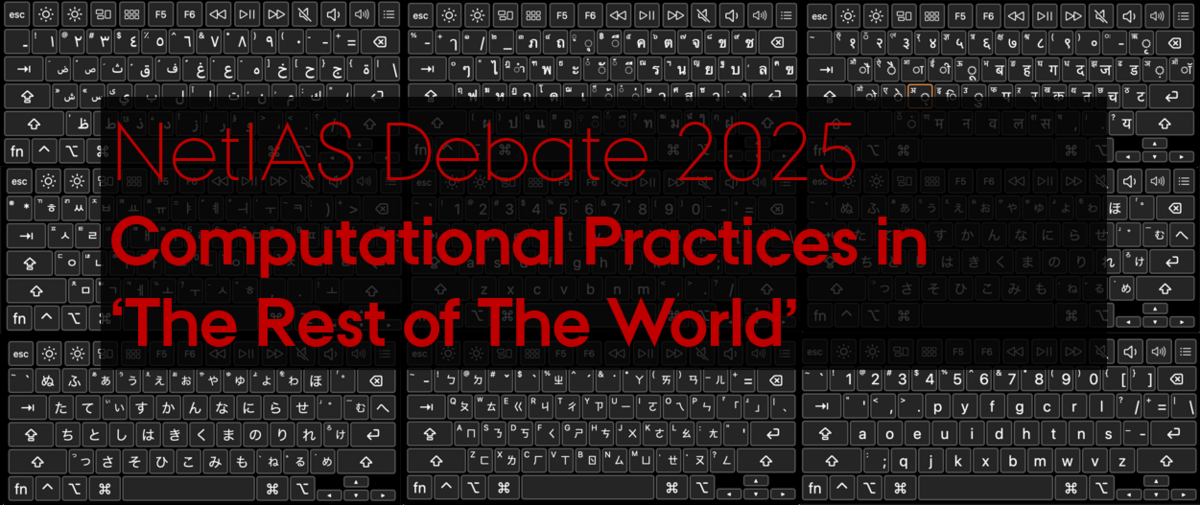
Using the interdisciplinary context of NetIAS, we would like to cordially invite you to take part in a NetIAS debate at Aarhus Institute of Advanced Studies 15 January 2025. The event follows on from a NetIAS debate in Bologna (Sept. 10-11, 2024), emphasizing European perspectives on natural language processing within computing.
The purpose is to bring research fellows within NetIAS and adjacent institutions together and instigate network and conversation on Computational Practice in 'the rest of the world', across disciplinary boundaries.
Across scientific fields, computational practices – including new developments of AI, social media, wireless networks, crypto currencies, and much more – are implicitly understood as a Western/Northern phenomenon, designed and studied predominantly through 'our' use cases, 'our' perceptions of 'intelligence', 'smartness', 'openness', 'usability', and so on.
Little attention has been given to how e.g., AI or blockchain technology is perceived, used, infrastructured, developed, designed, debated, regulated, critiqued, or in other ways practiced in what software licenses commonly refer to as 'the rest of the world' – those areas that we consider uncommon, excluded from the norm, and which typically are located in the Global South(s).
Within areas of critical theory, science and technology studies (STS), anthropology, and design/software studies, the development and diffusion of computational practices are often regarded as intrinsically related to modernity and the colonization of the rest of the world. Much research therefore focuses on how these ties play out today. E.g., on Big Tech’s use of the Global South(s) subjects and labor to both gather data and train models in unregulated settings; or on how technological development relates to the formation of decolonial futures.
Perspectives are however multifaceted: What laws regulate the use of surveillance technologies in the context of migration/immigration? What happens when AI is introduced in healthcare; or, crypto currencies in the economy? Are racial, social, economic, or other inequities reproduced or repudiated? How do governments encourage the development of AI or other technologies through policies and collaborations? How is click bait, fake news, CCTV critiqued, regulated, or used to exercise power and control?
The study of computational practice in 'the rest of the world'' potentially includes a wide array of disciplines, including, public health, agriculture, computer science, politics, economics, global studies, law, history, philosophy, and much more.
Participation is free and open to all interested. Participation can be with or without a paper presentation. Paper presentations can outline existing research, but can also be in the form of ideas, reflections, or work in progress. The event is free, but home institutions are expected to cover travel and accommodation.
Note! The event will take place in Aarhus but will be broadcasted via video link. A limited number of presenters will be allowed to present online.
All participants will be asked to send a 100-word biography, and all presenters will be asked to send an abstract of 300 words.
APPLY here - with a short bio of 100 words, and an optional abstract of 300 words (for presenters).
PROGRAM
09:15 | Registration & coffee |
09:45 | Welcome by Andreas Roepstorff |
10:00-11:15 | Panel 1 - Moderated by Jan Løhmann Stephensen |
| |
11:15 | Short break |
11:30-12:45 | Panel 2 - Moderated by Ilia Uthekhin |
| |
12:45 | Introduction of video: AI & 'Being Human' (by Mariam Khaled & Mahima Jain) |
12:50 | LUNCH |
13:45–15:00 | Panel 3 - Moderated by Maj Nygaard-Christensen |
| |
15:00 | Coffee break |
15:30-16:45 | Panel 4 - Moderated by Kasper Hedegaard Schiølin |
| |
16:45 | Final remarks |
The event is organized by Aarhus Institute of Advanced Studies and SHAPE – Shaping digital citizenship (Aarhus University) in collaboration with Bologna Institute of Advanced Studies.
